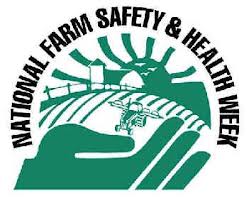It’s national farm safety week
September 20th, 2012 by Ric Hanson
This is National Farm Safety Week as experts look to try and cut down on the over 300 farm-related deaths that happen each year. Iowa State University extension safety specialist Charles Schwab, farming ranks as one of the most hazardous occupations. “The agricultural industry, as a whole, has a much higher death rate than any other industry, and higher than the whole average, nine times higher, than all the other industries combined. So it’s a huge number of fatalities that we deal with in our population,” Schwab says.
Iowa State University extension safety specialist Charles Schwab, farming ranks as one of the most hazardous occupations. “The agricultural industry, as a whole, has a much higher death rate than any other industry, and higher than the whole average, nine times higher, than all the other industries combined. So it’s a huge number of fatalities that we deal with in our population,” Schwab says.
Tractor roll overs account for the most farm deaths, and Schwab says they can be prevented if tractors have roll over protection or ROPS. “The phrase in Iowa which is very viable is we haven’t had a fatality from a roll-over with a tractor with ROPs and all of them have been with tractors without ROPs, and so a good life insurance policy is get the ROPs on the tractor,” according to Schwab. La Vonne Galles is the coordinator for Agri-Safe of Plymouth County, a division of the Floyd Valley Hospital in Le Mars. Galles says many times farm accidents occur because of fatigue, so she tells farmers to “take a break” from the busy harvest season.
“The main thing is just be careful, to think before we do anything, and try not to be, you know, so tired. I guess if we can take rest breaks and we can go at a pace that is conducive for good, safe, conduct, then that’s what I think we should be doing,” Galles says. She is worried the summer drought may present a new hazard on the farm in the form of aflatoxin mold in grain. “Yeah, its a respiratory issue of course and so that dust or mold that gets into our respiratory track. If we can avoid that by just using a mask, you know I think that is really important,” Galles says. “Think of that first before we enter into those grain bins, or even any close area that has the grain.” Galles warns that combines, grain trucks, wagons, and grain bins can often times be a playground for children, and she reminds farmers to always know the whereabouts of their children before moving equipment.
(Radio Iowa)





